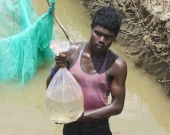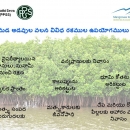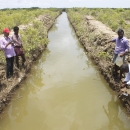Grants :: Small Grant Facilities :: Mangrove based aquaculture for vulnerable coastal communities in Sorlagondi village, Andhra Pradesh
Mangrove based aquaculture for vulnerable coastal communities in Sorlagondi village, Andhra Pradesh
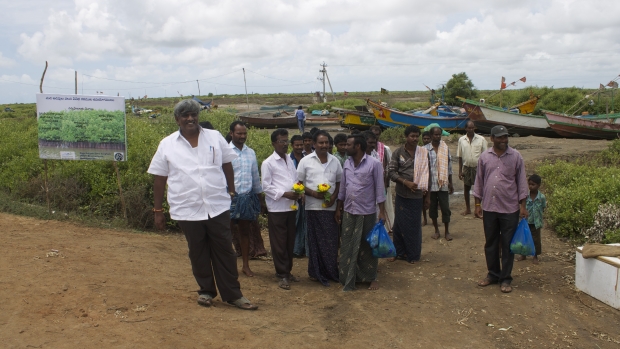
Communities prepare for the first harvest from their ponds , Sarlagondi Village, Andhra Pradesh © Nisha DSouza, 2015
Objectives
This project established the IMFSS system for marginalised fisher families, and the Yenadi tribe, in Sorlagondi village, towards poverty alleviation and food security. The specific objectives of the Small Grant Facility projects were to:
- Ensure that mangroves around Sorlagondi are conserved and managed effectively
- Provide equal opportunities for men and women to initiate and implement mangrove associated sustainable aquaculture
Background
Aquaculture around the world has helped to produce more fish, kept the prices of fish relatively stable, and made seafood more accessible to consumers. With over 16% of global animal protein sourced from fish, and rising trends in demand for good quality seafood, aquaculture must step up to meet the need. However, producing more fish sustainably without degrading the environment and depleting natural resources remains a challenge. Irresponsible and destructive aquaculture practices continue to threaten the industry. In India shrimp aquaculture met with devastating consequences in the 1990s as a result of disease outbreaks, leaving hundreds without livelihoods. In 1996 the Supreme Court put a halt to intensive shrimp farming; 60% of landowners were forced to abandon their farms. Investment was needed in India and around Asia, to implement newer, eco-friendly technologies and models, and their adaptation to local conditions.
In Andhra Pradesh fisheries production has increased from 179,130 tonnes in 1995 to 526,282 tonnes in 2014 (Department of Fisheries, Government of Andhra Pradesh). The pressures and threats to wild fish populations have increased over the years with the introduction of newer technologies, and the unsustainable catch of juvenile and breeding individuals. With the degradation of marine habitats and decreasing fish catch, artisanal fisher communities, and other marginalised/vulnerable coastal communities are amongst those worst affected and least benefitted in terms of livelihoods/income security.
Target beneficiaries
MFF and PPSS are working with the Yenadi tribe, classified as Scheduled Class, and living below the poverty line. 10 families are direct beneficiaries of this project. They live adjacent to a fishermen’s community in Sorlagondi, in temporary housing. They depend on the adjacent mangroves. They moved to the region 13 years ago, prior to which they hunted rats for farmers in agricultural fields, earning INR 5 per rat. They are particularly vulnerable to natural disasters, and have no food or income security, often turning to manual or agricultural labour in times of need.
Outputs
The 8 ponds were stocked with approximately 500 crabs, and 120 juvenile fish sourced from the wild and from the Central Institute for Brackish Water (CIBA), in total in September 2015. These were collectively worth INR 11,000. On average the cost of organic feed per pond is INR 4,320; it is suspected that over time this cost will vary depending on the tides and in periods of drought and flooding. Some funds for the feed came from the project; trash fish feed was also provided by CIBA.
Within the first three months, during which the crabs developed within the IMFFS ponds, the community made several intermediate harvests (as and when they required funds), and a final harvest 3 months later in early January (when the fish and crabs had reached optimum size). The harvest was sold in the local markets, and to intermediaries for export. During the mid-term harvests, 106 crabs were sold in total, fetching an average collective price of INR 112,400 in profit for the families. The final harvest (which was an integrated fisheries harvest) yielded a significant profit for the families of INR 295,925. The harvest sold included approximately 270 kg of crabs, and 61 kg of fish. This was despite survival rates of up to 60% as some families exceeded the carrying capacity of the ponds by stocking them with too many individuals.
On average a single Yenadi tribal family earned between INR 15,000 to 30,000 from their IMFSS pond within the first 4 months of construction. The fishermen families earned between INR 24,850 and 45, 280 from their established rehabilitated ponds.
Accomplishments and challenges
The Integrated Mangroves Fisheries Farming requires relatively low cost seed investment, is sustainable and environmentally friendly. The families can farm food in the relative safety of a closed system, with little or no effluent, mimicking nature (through the integration of mangrove plantations, and use of tidal influx), through no use of equipment, thus making the system energy efficient, and with sustainable and healthy feed ingredients (e.g. trash fish, and supplements brought in by the tides).
One of the biggest advantages for the communities is the fact that they can now sell crabs or fish whenever they need the money, instead of borrowing from money lenders and building up debt. There is a sense of financial security and empowerment growing amongst the families.
The project is a good example of how State Governments, IGOs (IUCN), and NGO’s with close community associations (PPSS) and technical knowledge (MSSRF) can partner to provide sustainable coastal livelihoods to marginalised communities in need.
Contributions to cross-cutting themes
Mangroves are increasingly being recognized for their production, and protective functions. This project demonstrates how fisheries and mangroves can be integrated for the benefit of local communities in terms of livelihood security, and protection from natural disasters.
Lessons Learned
It has been established that the IMFFS works but the system now needs scale, which requires associations with entrepreneurs and existing business to ensure that the products are well marketed and the communities continue to benefit. The system further requires policy support (particularly since most existing mangrove areas are under the Forest Department), and the aid of Government schemes for better replication potential.
The interventions now need to be up-scaled to address the needs of all the families of the Yenadi tribe. There is potential to strengthen and value-add for existing families implementing the IMFSS, such as fish pickle-making.
Related News
Farmed fish: a nature based solution for increased resilience
Andhra Pradesh, India 04 Oct 2016
Country: India
Topic: Capacity Building, Civil Society Engagement, Community Resilence ...
In 2007, IUCN and M.S. Swaminathan Research Foundation (MSSRF) partnered through the Mangroves for the Future (MFF) initiative to address a critical need. Across the east coast of India, abandoned land stand testament to unsustainable aquaculture pra...
Project Facts
Country
Location
Sarlagondi village, Andhra Pradesh
Topic
Duration
15th Dec 2014 to 15th Jan 2016
MFF Grant Amount
INR 977,000
Co-financing Partner
PPSS - INR 304,000
Related Images
Related Publications
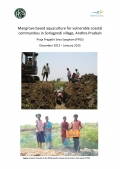
Mangrove based aquaculture for vulnerable coastal communities in Sorlagondi village, Andhra Pradesh
Author: PPSS and IUCN
Publisher: IUCN
Posted on: 12th May 2016
Category: SGF (Small Grant Facility)
Size: 12 MB
